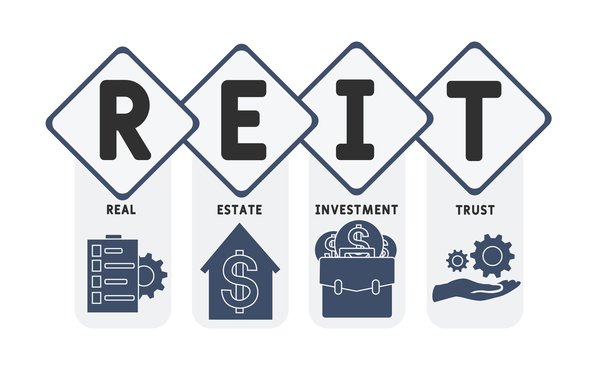Real estate investment trusts, or REITs, can be excellent investments. REITs generally have higher yields than bonds, making them good for income-seeking investors. But they also offer the prospect of your investment appreciating in value.
For most investors, it's a simple matter of investing in a publicly-traded equity REIT. But depending on your income, net wealth, and other factors, you may be able to invest in private or non-traded REITs. Moreover, it might make sense for some investors to put some of their wealth into these non-traded REITs.
Let’s take a closer look at the differences between traded and non-traded REITs and what to consider before deciding where to invest.
What is a REIT?
A REIT (pronounced "reet") is a special corporate structure for a business that owns, operates, develops, or manages real estate. REITs make real estate accessible to more investors.
By creating a corporation with certain tax benefits, REITs help level the playing field for retail investors who want to take advantage of the income and wealth-building power of commercial real estate. Most people don’t have a few million bucks laying around to buy a whole property. But with a REIT, you can buy part of one.
To qualify as a REIT, the company must:
- earn at least 75% of its income from rental income or other real estate activities,
- have 75% of its assets in real estate,
- have at least 100 shareholders,
- be no more than 50% owned by five or fewer individuals, and
- pay at least 90% of its net income as dividends.
By meeting these qualifications, a REIT qualifies as a "pass-through" entity. That means it doesn’t pay any corporate income taxes. The result is greater cash flow that it can pay out to investors in dividends.
What is a traded REIT?
A traded REIT trades on a public stock exchange, such as the New York Stock Exchange or NASDAQ. Traded REITs are highly liquid. Most large REITs see tens or hundreds of thousands of shares trade hands every market day.
In addition to liquidity, traded REITs are also open to investors of all types. All it takes is a brokerage account -- preferably with a low-cost online broker -- and the money to buy shares.
This is the way most individuals invest in real estate.
More investing topics
What is a non-traded REIT?
There are two kinds of REITs in this category: private REITs and public non-listed REITs (PNLRs).
Let’s start with private REITs. These differ from public REITs in very meaningful ways.
First, they are non-traded. That means they don’t offer shares anyone can buy and sell on a public exchange. Investments are made via private placements or direct solicitation of investors. Private REITs generally have stringent holding requirements. You might have five or more years with very limited or even no program in place for you to sell your stake. And it’s not unusual that if they do offer a redemption program, sales may be at a discount to the REIT’s value.
Second, only accredited investors are legally permitted to invest in these kinds of REITs. You must meet certain income and/or net wealth minimums to be accredited. Private REITs tend to focus on large, institutional investors like pension funds and organizations with large endowments.
Lastly, private REITs aren't required to register with the Securities Exchange Commission (SEC). That also means they don't file financial reports. This reduced oversight creates substantial risk for individual investors without the resources or expertise to understand and verify the suitability of any individual company.
The end result is this: Private REITs aren’t accessible to most investors, and wouldn’t make for an ideal investment even if they were.
Public non-listed REITs fall between publicly traded REITs and private REITs.
They don’t trade on stock exchanges, and they tend to have the same redemption limitations as private REITs. But they're registered with the SEC. So they get enhanced oversight and have publicly accessible financial filings that are audited by an approved accountancy firm. They're also often subject to oversight by state securities regulators.
Due to higher regulatory oversight, PNLRs are accessible to most individual investors.
The pros and cons of traded and non-traded REITs
Both traded and non-traded REITs can make excellent investments. But because of the differences in their trading and ownership rules, it’s important to understand their differences.
| REIT Type | Pros | Cons |
|---|---|---|
| PUBLIC REITs |
-Highly liquid. -Easily accessible to investors of all types. -SEC regulatory oversight reduces risk for individual investors. |
-More volatile than other options. -Subject to market valuation swings like other equities. -Lack of required holding period can result in selling for a loss during market downturns. |
| PRIVATE REITs |
-May offer higher-return investments than available on public markets. -Long-term holding period helps management focus on long-term strategy. -Reduced regulatory oversight means lower operating costs, which can boost returns. |
-Accredited investor requirement eliminates accessibility for most individuals. -Large minimum investment requirements further reduce investor pool. -Limited or no redemption plan may make it difficult or impossible to sell. |
| PUBLIC NON-TRADED REITs |
-Potentially higher-quality investments available. -Required to submit financial disclosures -- including audited annual filings -- to the SEC; also subject to state regulatory scrutiny. -Lack of public trading and long-term holding requirement can help management focus on long-term strategy. |
-Minimum investment requirements. -Broker fees and commissions. -Minimum holding period requirements may not match up with individual investors’ goals. |
Traded or non-traded REIT? It depends on you.
Traded REITs are the best way for most individual investors to own and profit from real estate. This is particularly true for less-experienced investors. These investors are unfamiliar with real estate investing or don't have the income, net wealth, or disposable capital to invest in non-traded REITs.
There are often high fees for public, non-traded REITs without accredited investor requirements. You'll usually make this type of investment with a local broker who makes a big commission by selling you an investment in this type of REIT. If you need to exit that investment, it can be much more difficult. Chances are you’ll sell at a discount to the market value of the investment and pay more fees to a broker who helps you find a buyer.
But there are investors with high net wealth, disposable capital, and the capacity to make an investment for many years without needing to access that capital. Non-traded REITs can present unique opportunities for higher-yield and higher-return investments for these investors.
The answer to "which is best for you?" is a product of your knowledge, experience, and financial situation. For most investors, traded REITs are best. But as your wealth and experience grow, you may find a compelling non-traded REIT opportunity that’s ideal for you.



































